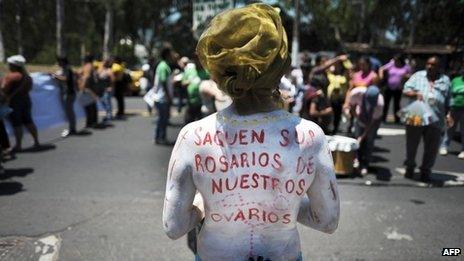El Salvador abortion woman allowed early C-section
- Published

A seriously ill woman who was denied an abortion by the Supreme Court of El Salvador says she will undergo a premature Caesarean section next week.
Lawyers for the 22-year-old asked for an abortion on the grounds that her life was at risk, as she suffers from lupus and kidney failure. Her child is likely to die soon after birth.
Abortions are prohibited in El Salvador under any circumstances.
But the health minister said the C-section was an acceptable intervention.
"It is very clear at this time that the pregnancy intervention is not an abortion, it is an induced birth, which is something else," Maria Rodriguez told a news conference.
She stressed that protecting the life of the pregnant woman - referred to as "Beatriz" - was the "decisive factor".
Speaking to AFP news agency, Beatriz said she was "very nervous" but wanted the Caesarean section to guarantee her own health.
"What they did to me was not right. They made me suffer by waiting all this time here in the hospital," she said speaking from the National Maternity Hospital in San Salvador.
She has had no contact from anyone in government with details of next week's surgery, she adds.
A medical committee at her maternity hospital, the Ministry of Health and rights groups had all supported Beatriz's request to terminate her pregnancy, but judges at the Supreme Court voted four-to-one to reject the woman's appeal on Wednesday.
In their ruling, the judges said: "This court determines that the rights of the mother cannot take precedence over those of the unborn child or vice versa, and that there is an absolute bar to authorising an abortion as contrary to the constitutional protection accorded to human persons 'from the moment of conception'."
The judges said physical and psychological tests showed that Beatriz's illness was under control and she could continue with the pregnancy.
One of the judges, Judge Gonzalez, said he had not been convinced Beatriz was at risk of dying if the pregnancy was allowed to continue.
However, tests show that Beatriz's 26-week-old foetus is developing without a complete brain, a condition called anencephaly. Almost all babies born with this condition die before or shortly after birth.
The case has drawn international attention to El Salvador's strict abortion laws, particularly from campaigners for the legalisation of abortion in cases where the mother's or foetus's life are at risk.
- Published30 May 2013
- Published15 January 2013
- Published3 February 2015